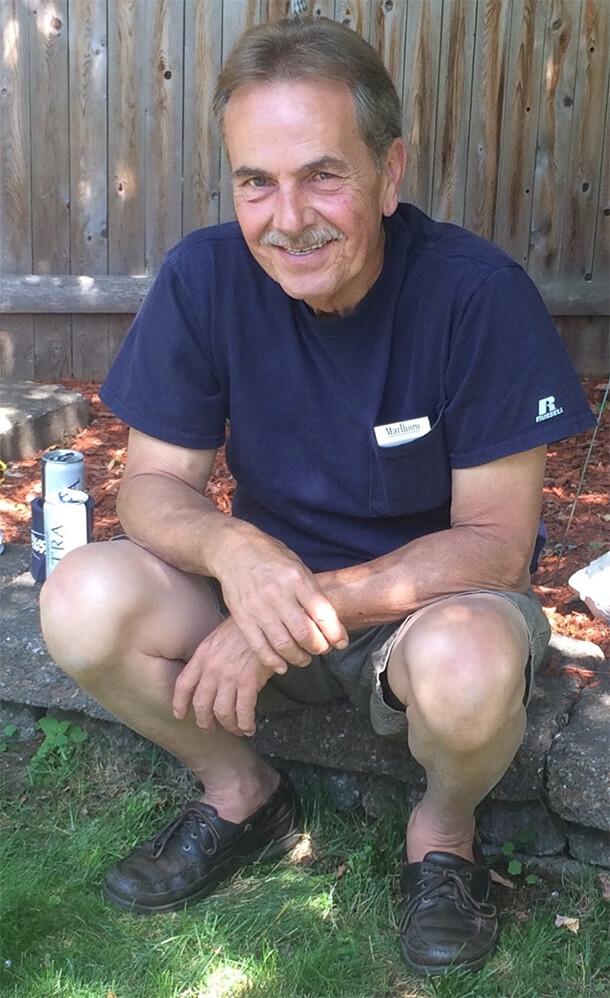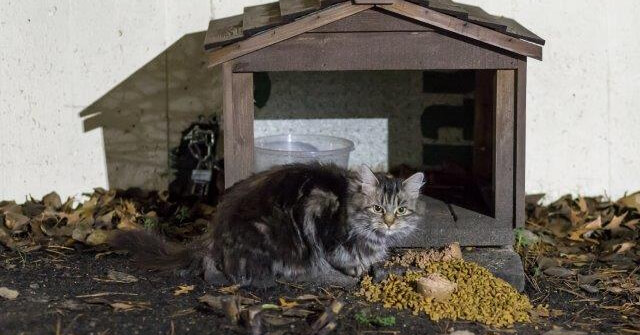
Ken DiPerna is a janitor at Massasoit Community College, and a member of AFSCME Local 1067 (Council 93). Of late, he’s been gone from his job, undergoing treatment for a serious illness. But on some days, especially Sundays, he just can’t stay away.
What keeps him coming back to Massasoit, according to his colleague Denise Gomes, is a family of feral cats that lives in a wooded area on campus.
He began feeding them several years ago when he took a custodial job at the college. Many people didn’t know the cats even existed. True to his quiet personality, DiPerna befriended the cats, who came out only at night, and fed them for years without anyone making a fuss.
But then the cats had kittens. One day, someone reported a litter of kittens in one corner of a building, where their mother may have taken them to keep them safe.
That’s when management told DiPerna he had to stop feeding the cats.
“They were afraid of rabies and such,” he says. “They said it wasn’t healthy to keep feeding the cats.”
DiPerna was in a tough spot: The warning was stern enough that he wasn’t sure if his union could intervene. On the other hand, he feared that the cats might die under his watch.
“I actually didn’t feed them for an entire week,” he says. “And I had to watch them meowing. They kept meowing.”
That’s when Gomes, a colleague who is an administrative assistant in the maintenance department, stepped in.
 Free food is set out by custodial workers who are AFSCME members at Massasoit Community College. (Photo by Igor Klimov)
Free food is set out by custodial workers who are AFSCME members at Massasoit Community College. (Photo by Igor Klimov)“I was dealing with outside organizations trying to get them to come in and humanely remove the cats,” Gomes says. “But they said that removing them would be the worst thing. … These cats are probably being managed by a tom cat and if you remove the cats, then all the wild cats from the area will come down and you’ll have a bigger problem than before.”
The possibility of making the situation worse encouraged the administration to seek an alternative. With the help of DiPerna and Gomes, a Free Roaming Cats Committee was set up and a non-profit organization, Bay State Animal Cooperative, Inc., came in to do a presentation.
It was decided the cats would be immunized, spayed and neutered, and released back on campus. A feeding station was set up so they could be fed at regular intervals and monitored. Any new kittens were socialized and then given up for adoption.
DiPerna continued to be the cats’ main caregiver, feeding them every day.
Then came the day when he called to say he was ill. He wouldn’t be able to take care of the cats any more, but he wanted to make sure somebody would. DiPerna’s co-workers stepped up to do that in DiPerna’s absence. Donations of cat food were collected, and there is plenty to keep the animals fed for the foreseeable future.
Asked about his role in saving the cats’ lives, DiPerna says, “I don’t think I deserve a lot of the credit here. I was just a grunt putting the food out. I’m a blue-collar worker that goes to work every day. I take care of business and I go home. I follow the rules. That was just an everyday thing for me.”
Gomes disagrees. “Ken saw a need and filled it,” she says. “He received no recognition, spent his own time and money, fought for what was right and humane and never gave up.” That’s the never quit spirit of AFSCME members. To nominate someone, visit: http://neverquit.afscme.org/awards
